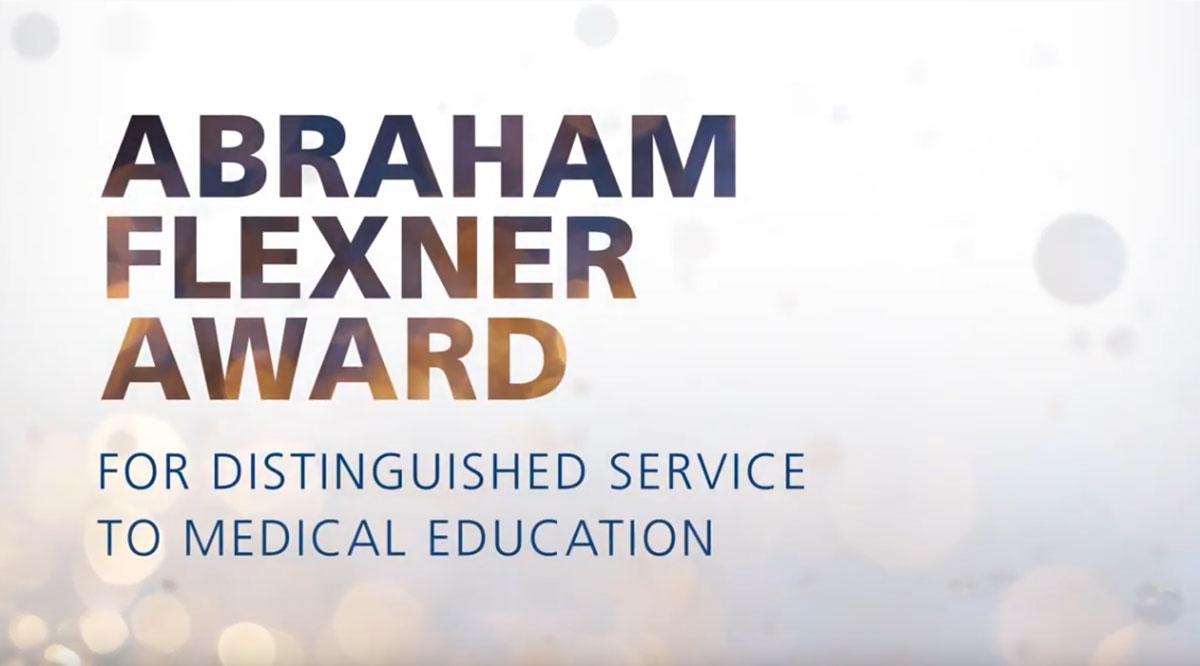As part of its commitment to becoming an anti-racist, diverse, equitable, and inclusive organization, the AAMC announced on Nov. 17 that it was renaming its most prestigious award — the Abraham Flexner Award for Distinguished Service to Medical Education. Starting in 2021, the award will be called the AAMC Award for Excellence in Medical Education.
The change was announced by AAMC President and CEO David J. Skorton, MD, during the Leadership Plenary at the AAMC’s annual meeting, Learn Serve Lead: The Virtual Experience.
“Historically, Abraham Flexner has been associated with rigor in academic medicine. In fact, the Flexner report recommended valuable changes in medical education, many of which still have positive impact today,” Skorton said. “But that report also contained racist and sexist ideas, and his work contributed to the closure of five out of seven historically Black medical schools. Our action today recognizes the long-standing negative impact of the Flexner report on the training of Black physicians and the health of the Black community in the United States.”
AAMCNews spoke with several experts in medical education to provide some context around the decision to rename the award.
Who was Abraham Flexner?
Often called the “father” of modern medical education, Abraham Flexner was an education specialist who was commissioned by the Carnegie Foundation for the Advancement of Teaching to assess the state of medical education in the United States and Canada in the early part of the 20th century. Flexner visited all 155 medical schools existing at the time and issued a detailed report in 1910 — Medical Education in the United States and Canada, also known as the Flexner report — that called for major reforms to medical education, including higher admissions standards for students, adherence to the scientific method in research and practice, and oversight by state licensure boards.
What was the outcome of the Flexner report?
The Flexner report is widely credited with standardizing and improving medical education, particularly in its insistence that rigorous scientific methods form the basis of education and training of future physicians. The model it promoted — in which two years of basic science instruction is followed by an additional two years of clinical instruction — is still utilized by many medical schools today.
But those more rigorous standards came at a cost, particularly for schools that did not have the resources to implement them. Indeed, within 15 years, 89 of the original 155 schools had closed, including five of the seven existing schools devoted to educating Black physicians. “Black medical schools also had fewer financial and human capital resources due to systemic disinvestment in education,” says Clarence Fluker, AAMC director of community engagement.
The closure of the majority of Black medical schools had — and continues to have — a disproportionate impact on the physician workforce. In 2018, just 5% of physicians were Black or African American, despite the fact that Black and African American individuals represent 13.4% of the U.S. population. An August 2020 study published in JAMA Network Open estimated that if all seven medical schools that educated Black physicians in the early 20th century had remained open, an additional 35,315 Black physicians would have entered the workforce between the time the schools closed and 2019. “The Flexner report exacerbated systemic racism in medicine, since at the time many of the remaining medical schools would not train Black physicians due to racist admissions policies,” says Malika Fair, MD, MPH, AAMC senior director of health equity partnerships and programs.
Women were also impacted by the Flexner report. In 1900, women accounted for 6% of practicing physicians nationwide, and in 1909, they were accepted at 91 of the 155 medical schools — including three schools dedicated exclusively to educating women. However, by 1940, just 4% of physicians were women, in part due to the closure of many schools that had accepted higher numbers of women but also due to a societal backlash against the role of women in the medical profession. Women did not begin to catch up until the 1960s, and they still lag behind their male peers in compensation, leadership positions, and research publications.
Why is the AAMC renaming this award?
While the closure of schools that educated women and Black physicians has had an enormously negative impact on the profession, it is Flexner’s racist and sexist views that have prompted the AAMC to take action, says David Acosta, MD, AAMC chief diversity and inclusion officer.
In his report, Flexner wrote that while women were not barred from applying to medical school, they “show a decreasing inclination to enter it” — and that those who did had “obvious limitations.”
Black students, he said, should be trained as “sanitarians” rather than surgeons and their primary role should be to protect White people from disease. “A well-taught negro sanitarian will be immensely useful; an essentially untrained negro wearing an M.D. degree is dangerous,” Flexner wrote.
“Flexner’s racist and sexist views, pejorative language, and unsubstantiated statements negatively impacted physician training for women and Black/African Americans and adversely impacted the health of the Black and African American communities in the United States,” Acosta says. “We must not ignore medicine’s racist history and make every effort toward reparation when this history is identified.”
What about all the past recipients of this prestigious award?
The Abraham Flexner Award for Distinguished Service to Medical Education was first presented by the AAMC in 1958 to honor an individual or a team of two individuals whose contributions have had a demonstrable impact on advancing medical education.
“For more than half a century, this award has recognized individuals whose work has had a profound impact on medical education. The name change does not in any way diminish the prestige and value of the award for previous recipients,” says Alison Whelan, MD, AAMC chief medical education officer. “But just as we recognize the positive impact that Flexner had on modern medical education, we also can no longer ignore the negative repercussions of Flexner’s words and work.”
“Dedicating a namesake award to Abraham Flexner is antithetical to our shared vision of the AAMC and academic medicine institutions as diverse, equitable, inclusive, and anti-racist organizations,” says Skorton. “Recognizing the complexity and symbolic nature of awards, the AAMC decided to take this action now to demonstrate our commitment to these ideals.”
The name change will take effect for the 2021 awards cycle, for which the AAMC is now accepting applications. To view criteria for the AAMC Award for Excellence in Medical Education or to nominate an individual or a team of two individuals whose contributions have had a demonstrable impact on advancing medical education, visit the AAMC Awards page. Nominations are due Jan. 22, 2021.

